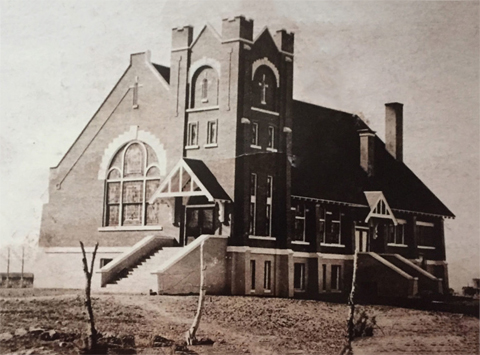Eliza Horne was born on the twentieth of October, 1823, in Wakefield, Yorkshire England. She was born into an aristocratic, wealthy English home. Her father, Joshua Horne was a pioneer in the business of manufacturing glass bottles. His beautiful home and estate was known as Redhill, at Castleford, Yorkshire, England. This was one of the large beautiful estates for which England was famous in days gone by. Joshua’s home, fortune and business was left to his only son Joshua and his daughter Eliaza. Joshua of course retaining the larger share and also acting as custodian and administrator for Eliza.
The son Joshua was also an able business man, adding to the family fortune by inventing a method for making long little, necked bottles. This opened up many new types of fancy bottles and his business greatly prospered. He, as a wealthy English business man, brought a display train to the world fair held in Chicago. He also bought controlling shares in the Waldorf Astoria in New York at a time when it was in danger of folding. When he died he left to his own posterity a fortune and property worth three million dollars.
Eliza was a beautiful girl and grew up with all the advantages of an aristocratic wealthy home. She was a beautiful singer and had a great deal of musical training. She played the harp remarkably well and was considered a very accomplished young lady.
Eliza married Charles Hartley and a few years after they were called on by the Mormon Elders. They were baptized into the Church of Jesus Christ of Latter-Day Saints in Ap[ril 1843. Eliza’s family were very angry at this. She was disinherited but gladly she gave up all her wealth and social position for the gospel.
With her husband and three children she immigrated to America. Her heart must have ached with sorrow as she severed all ties with her previous life, and leaving two children buried in England came to Zion for the sake of the gospel. What hardships that young mother must have gone through. Their company of saints suffered greatly from hunger and sickness. She cared for her family of young children the best she could, but was helpless against the malnutrition and dysentery that plagued them. The baby Samuel, who was sick when they left Liverpool, became worse and died of dysentery. They buried him at sea and considered themselves lucky that the others had been spared.
She crossed the plains, going through the hardships and trials that all the saints endured. They settled first in Salt Lake and though they were called to move many times, and comforts of home were scarce, the little English Lady worked unceasingly to make home attractive and pleasant. Her beautiful needlework brightened the barest of homes and her immaculate housekeeping kept things cheerful and bright.
Her grandchildren tell of loving to go to Grandma’s because of her wonderful cooking. Her floor was always scrubbed until you could see your face in it.
Mother recalls hearing her father, (Eliza’s first child) tell this about his mother. He was working on the Salt Lake temple with his father. At noon his mother came over with their lunch. She was delighted as she noticed an old blind man playing a harp for the amusement of the men and in the hopes that he could share their lunch. Eliza eagerly asked if he might be permitted to play it “just a little”. Then sitting down she sang her old, dearly familiar airs in a beautiful clear voice, thrilling her boys and the surrounding workers. It must have been wonderful! Mother says “ daddy loved to tell the story and tears always flooded his eyes as he remembered the occasion.
Eliza’s beautiful singing voice did not go unnoticed. She sang in the first choir and at many pioneer gatherings. Her lovely singing was greatly admired by President Young and Charles and she became good friends with him. One time in order that she could sing a solo at a General Conference, President Young loaned one of his wife’s dresses to her.
She was always a faithful worker in the auxiliaries of the church. A part of her heart must have always yearned a little for that life which she left in England. Her granddaughter Eliza Hinman, commenting on how wonderful it was to be able to stay at Grandma’s and sleep in her feather bed. She remembers being there once when a letter from England came. “How excited she was and how thrilled as she ran into the house exclaiming over and over, “ Oh it’s from Joshua! It’s from Joshua!”
Eliza Horne Hartley died in Clinton, Utah on the 27th day of December, 1908. She was buried in Bountiful Utah. She had sacrificed everything for the gospel and worked hard to instill a testimony of its truthfulness into her children. We, her descendants, are indeed grateful to her for these sacrifices and the heritage she left to us.
